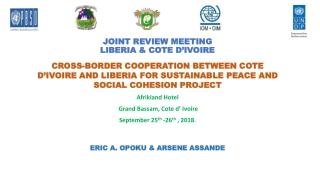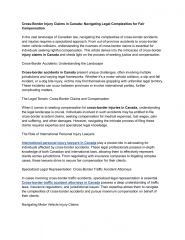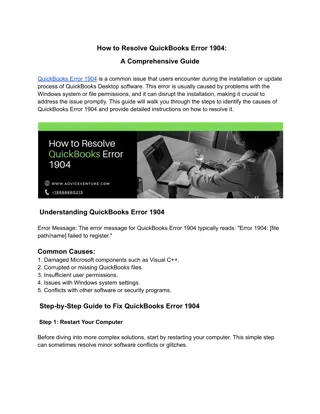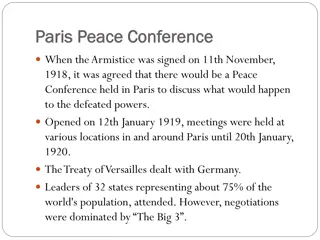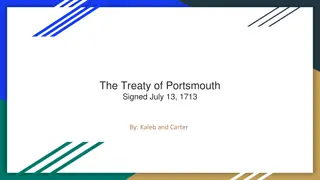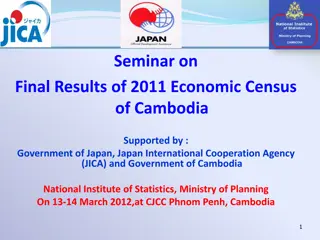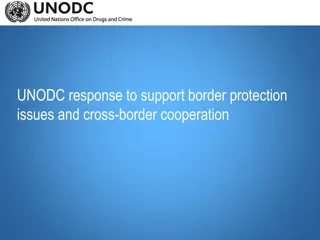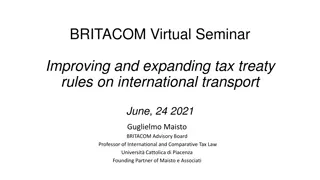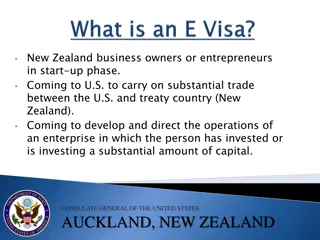Dispute Over the 1904 Border Treaty: Thailand vs. Cambodia
The dispute between Thailand and Cambodia over the 1904 border treaty involves conflicting claims regarding the location of the Preah Vihear Temple. While Thailand contends that Siam's actions are justified, Cambodia argues otherwise. The cases discussed touch on principles of treaty interpretation, voting acceptance, intention during treaty negotiations, and fulfilling treaty obligations.
Download Presentation

Please find below an Image/Link to download the presentation.
The content on the website is provided AS IS for your information and personal use only. It may not be sold, licensed, or shared on other websites without obtaining consent from the author.If you encounter any issues during the download, it is possible that the publisher has removed the file from their server.
You are allowed to download the files provided on this website for personal or commercial use, subject to the condition that they are used lawfully. All files are the property of their respective owners.
The content on the website is provided AS IS for your information and personal use only. It may not be sold, licensed, or shared on other websites without obtaining consent from the author.
E N D
Presentation Transcript
Law of treaties Tomasz D browski
Preah Vihear Between Thailand and Cambodia, there is a dispute over the 1904 border treaty (concluded between Tailand - then Siam - and France). The delimitation commission has drawn up a map where Preah Vihear Temple is located in Cambodia. Siam accepted this fact - which confirms the use of maps in accordance with the conditions of the Treaty, and the visit of the Prince in the temple, when he knew at its tip is the French flag and did not react. Thailand claims that it does not respond to the actions of Siam. Which country is right? What are the conditions for applying the estoppel principle?
Prince Damrong visiting Preah Vihear temple (2nd from right) http://editorials.cambodia.org/2009/10/fwd-prince-damrong- accepted-that-preah.html
https://www.thehistoryhub.com/wp-content/uploads/2015/12/Preah-Vihear-https://www.thehistoryhub.com/wp-content/uploads/2015/12/Preah-Vihear- Temple-Images.jpg
1. Adoption of the text At an international conference convened to accept the negotiated treaty, the participating countries adopted the treaty with an absolute majority. Is it acceptable to accept the treaty text by voting? Is the acceptance of the text by an absolute majority of votes consistent with the VC? 9
2. Intention During the negotiations between states A and B, the representative of State B expressed his intention to sign the negotiated treaty subject to ratification. However, the Treaty does not contain such a provision. Both countries signed a contract, after which State A called on B to fulfill its obligations - it appears from the treaty that it entered into force on the date of signature. B claims that the treaty has not entered into force. Which country is right and why? 31
3. Purpose of the treaty States A and B have signed, subject to ratification, an agreement to establish a joint reserve for wildlife in the border areas of both countries. State A immediately transferred to this area many deers. State B has notified A that it withdraws from the will to conclude the treaty and has created a center for aggressive dog training. State A wants to remove the center, because according to Art. 18 VC in the period after signature, and prior to ratification, states are obliged to refrain from activities that frustrate the purpose of the treaty Does country B have to close the center?
4. Join Five countries have signed the Convention on Cultural Cooperation. The issue of joining new states was not discussed during the negotiations and in the text of the agreement. State A wants to become its party. Four states have agreed, but State B has objected. Can the A country join this convention? 19
5. Responsibility State A made an international obligation (within an agreement) to abolish the penalty of confiscation of property, but the judge of that country ruled it on the basis of the unchanged state law (criminal law). The judge justified the ruling: courts are independent and binded by the Constitution and the domestic law, so State A are absolved of responsibility. Rate the judge's reasoning. Who is responsible and why?
6. Reservations At the international conference organized by the International Organization UM, countries A, B, C and OMZ signed a cooperation agreement in the field of science. State C signed the agreement, but raised two reservations. State A immediately notified the objection to the first reservation. It was only after some time that politicians in State A realized that the decision they had raised reservations was unfavorable. How and when can a State withdraw the reservation? Does the Vienna Convention on the Law of Treaties apply here?
7. Object The treaty between States A and B deals with the removal State s A naval military bases in the vicinity of the State B. The introduction of the Treaty indicates that A and B seek peaceful settlement of relations and that the abolition of these bases is intended to increase the sense of security in both countries. State A, according to the agreement, removed the base, but a week later it formed the same, but in the village located 5 km away. Can State B demand a removal of a new base?
8. Domestic law The President of the Republic of Poland, while leaving for the holidays, ordered the head of the Chancellery (the Minister of State for International Relations) to settle the current affairs. The minister has ratified 5 agreements - the agreement 2 with the prior consent of the parliament expressed in the statue. Upon his return, the President was dissatisfied and fired the minister. He notified the parties that contracts 1 and 2 were concluded contrary to Polish law and did not bind Poland. The remaining contracts were actually executed. After 3 months, the President also declared invalid 3, stating that he still wonders on 4 and 5. What is the status of contracts 1-5? 46
9. Importance States A and B have entered into a delimitation agreement. As soon as the contract entered into force, it was noted that the geographical coordinates of the two points were wrongly identified, resulting in A having lost several square kilometers. And she notified this fact by proposing amendments. B has refused, as the contract has already entered into force, and it is also of little importance. And he replied that the deal is invalid. B has objected. Is the contract valid? Will A recover the due territory?


